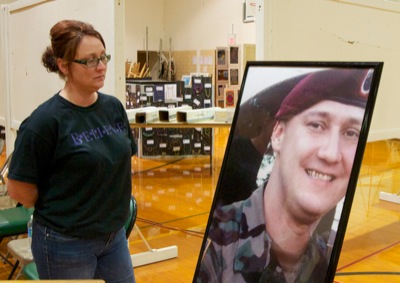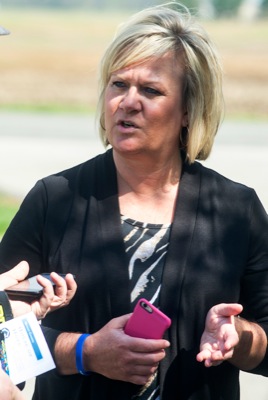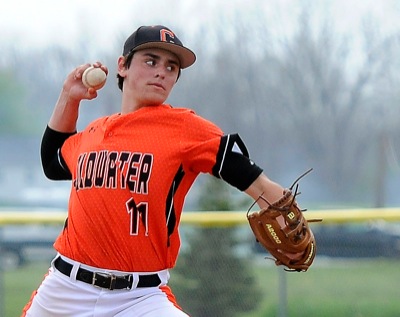Wednesday, April 27th, 2016
Addicts recount their struggles with abuse
Area woman tells Celina students of dangers of drugs
By Claire Giesige

Photo by Claire Giesige/The Daily Standard
Jackie Sheridan looks at a picture of her deceased brother, Gary McCowan. Sheridan on Tuesday shared her and her brother's story with Celina High School students to warn them of the dangers of drug use. Sheridan and five other members of A Better Life - Brianna's Hope were invited to speak at the school by Celina branches of SADD and Family, Career and Community Leaders of America.
CELINA - As Mercer County continues to struggle with drug-abuse problems, Celina High School students on Tuesday heard firsthand experiences and testimonials of recovering drug addicts.
Celina branches of SADD and Family, Career and Community Leaders of America invited members of A Better Life - Brianna's Hope to speak about their struggles with drugs and alcohol. Five speakers along with Better Life pastor Randy Davis shared with students and staff the life-altering - and sometimes life-ending - consequences of addiction they had both witnessed and lived.
Most members drove several hours for the event, but one advocate didn't have very far to go. Jackie Sheridan of Fort Recovery was on hand to share her story and her brother's.
The siblings were born to teenage parents and grew up poor in Jay County, Ind. Sheridan explained they had been raised by her mother and stepfathers, who were drug dealers.
"It was very chaotic," she said. "Sometimes getting off of the school bus, there were certain cars sitting there, and you knew you wouldn't be able to go in the house because there was a drug deal happening in the kitchen."
Her younger brother, separated by only 13 months, was her only sibling. The two were very close, she said.
"When you grow up in a family that's full of drugs, there's a lot of chaos. So we protected each other," she said. "He was my little brother, and I always felt like I was responsible for making sure he was OK."
Childhood trauma caused Sheridan to have nightmares, and as a result she turned to drugs. Her drug use began at age 13 and continued through high school until her senior year when she experienced severe drug-induced hallucinations.
"I can never explain to you what that was like, feeling things that weren't there crawl all over you," she said. "I never touched drugs again."
After graduating, Sheridan packed her bags and headed to Florida in pursuit of a clean start. She got a full-time job, put herself through college, got married and had children.
"I was fortunate," she said. "I succeeded. My brother was not so lucky."
Her brother, she said, starting doing drugs when he was 13 years old. By the time he was 14, he was a drug dealer. In his early 20s, she helped him get into rehab, and he later joined the Army.
"I was so proud of him," she said, adding she was full of hope for his future. "But see, when you're an addict, it never leaves you. Nobody ever chooses to be an addict. ... But it takes over before you know it."
On his third tour in Iraq, the father of three was injured and sent home with a brain injury. He was given opiates for severe PTSD and a bipolar disorder. When those stopped working, he turned to a spectrum of serious drugs.
"I watched my brother lose everything," she said. "He lost his wife, his children, his trucks. He was homeless."
His choices caused her to make some of the hardest decisions of her life, she said. For 10 years he was homeless, and while she took him blankets and food, she couldn't let him into her house as she raised her children, for fear he would bring heroin with him. Further complicating matters, her son became an Army Ranger and was deployed overseas.
"My son was in the same place where my brother was injured," she said. "That's a lot to handle, being proud of your family for serving but being scared to death they'll come home broken. It's terrifying."
Sheridan, who spoke with a picture of her brother in uniform to her right and a picture of his tombstone to her left, became emotional as she told the students of her brother's final year. He died of a drug overdose last summer, she said.
"I don't want to ever see another family go through that. Because now instead of getting a phone call, I have to go to a cemetery and talk to a tombstone," she said.
Better Life was founded in memory of Brianna DiBattiste, an Indiana woman who had battled addiction until her death in 2014, and offers support for those struggling with addiction. For more information, visit ablbh.org.



